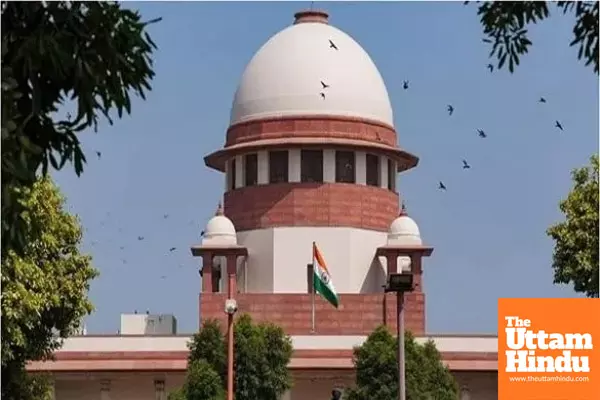
SC Questions Centre On Waqf: Will Hindu Religious Trusts Allow Non-Hindus? Detailed Hearing on Thursday

New Delhi (The Uttam Hindu): The Supreme Court is set to continue its detailed hearing on the Waqf Amendment Act on Thursday. During a previous 2-hour hearing, the court was about to dictate an interim order regarding "Waqf by user" and nominations to the Central Waqf Council and State Aukaf Boards. However, Solicitor General Tushar Mehta and senior advocate Rakesh Dwivedi requested a more in-depth hearing.
Key Points of Concern:
1. Waqf by User: The court seeks clarification on the scope and ambit of "waqf by user," which refers to land or property treated as waqf over time through continuous public or religious use, even without a formal waqf deed.
2. Non-Muslim Representation: The court questioned the strength of non-Muslim members in the Waqf Council, highlighting the need for clarity on this aspect.
3. Interfaith Inclusion: The court's query about allowing Muslims to be part of Hindu religious trusts sparks debate on interfaith participation in religious trusts.
The bench, led by CJI Sanjiv Khanna and including Justices Sanjay Kumar and K V Viswanathan, noted that while several provisions of the Waqf Amendment Act are beneficial, some aspects require clarification. Senior advocate Kapil Sibal invoked Article 26 of the Constitution, stating that if a person wishes to create a Waqf, they are now required to prove adherence to Islam for the past five years. “If I am born a Muslim, why should I have to prove this? Personal law should apply in such matters. Once the requisite documents are provided, the Waqf should be valid,” Sibal argued.
Responding to this, Chief Justice of India Sanjiv Khanna remarked that Article 26 is a secular provision, and it is applicable equally to all communities.
Meanwhile, senior advocate Abhishek Manu Singhvi raised concerns regarding the status of Waqf properties following recent amendments to the Waqf Act. He informed the court that out of approximately eight lakh Waqf properties in India, more than four lakh are registered under the category of 'Waqf by User'—a classification now facing legal uncertainty due to the legislative changes. Sharing his own experience, CJI Khanna recalled a case during his tenure at the Delhi High Court where a plot of land was claimed as Waqf property. “Let there be no misunderstanding—we are not suggesting that all 'Waqf by User' properties are invalid,” he clarified.
After a two-hour-long hearing, just as the Supreme Court was preparing to pronounce an interim order regarding ‘Waqf by user’ and appointments to the Central Waqf Council and State Aukaf Boards, Solicitor General Tushar Mehta and senior advocate Rakesh Dwivedi urged the bench to hold a detailed hearing on the matter. Supreme court is now set for detailed hearing of the case on Thursday.

